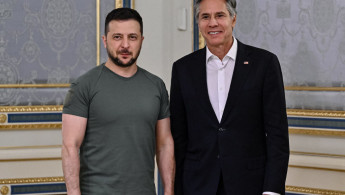Blinken announces $2.8 billion US aid to Ukraine as Kyiv military breakthrough
US Secretary of State Antony Blinken announced $2.8 billion in military aid to Ukraine on a surprise visit to the eastern European country as Kyiv claimed a military breakthrough in its counter-offensive against Russian invaders.
Ukraine said its forces made gains both in the north, the south and the east, prying back land seized by Russia which had hoped for a swift victory when it attacked nearly seven months ago.
⚡️ Blinken visits Kyiv to announce $2 billion in military aid to several countries including Ukraine.
— The Kyiv Independent (@KyivIndependent) September 8, 2022
U.S. State Secretary Antony Blinken arrived in Kyiv on Sept. 8 to announce $2 billion in foreign military aid to 19 countries, including Ukraine, at risk of Russian aggression.
In the area around Kharkiv, Ukraine's second city, Kyiv's forces penetrated 50 kilometres (31 miles) beyond Russian lines and "liberated" more than 20 towns and villages, senior military official Oleksiy Gromov said.
Hoping to build momentum, Blinken secretly travelled to Kyiv for his second trip during the war, passing through dark hallways with sandbags that guarded the windows to discuss the military aid with President Volodymyr Zelensky.
The Ukrainian leader voiced gratitude for the "enormous support" from the United States which was helping to "return our territory and lands".
Blinken, in a statement on the talks, hailed "Ukraine's extraordinary frontline defenders" who "continue to courageously fight for their country's freedom".
President Joe Biden "has been clear we will support the people of Ukraine for as long as it takes," Blinken said in a statement.
Ukraine has successfully launched a counter-attack in the Kharkiv area, and with that, captured several villages back into Ukraine's possession. International observers have reported a breakthrough by Ukrainian forces.
— Tero Kaunisto💛💙✌ (@tero_kaunisto) September 8, 2022
The latest package includes $675 million to be shipped shortly in arms, ammunition and supplies and another $1 billion in longer-term loans and grants for Ukraine to buy more US equipment.
The State Department also approved $1.2 billion for 18 other nations seen as facing threats from Russia including Baltic states and Moldova and Georgia, which both have breakaway regions backed by Moscow.
A day after the United Nations said there were "credible reports" of Russia forcing Ukrainian children into its territory, Blinken started his trip by visiting toddlers injured in the war at a hospital.
In a room with toy trucks and alien figurines, Blinken arrived with a basket of stuffed animals.
"I brought some friends," Blinken told the children.
"The spirit of your children sends a very strong message around the world," he said.
Blinken also knelt down to pat Patron, a fabled Jack Russell terrier that has helped Ukraine's military find more than 200 mines laid by Russian forces.
A Ukrainian assault has started for Shevchenkove settlement tonight claimed by Russian news agency WarGonzo. A breakthrough from that settlement will give Ukraine a 28 km distance to the key city of Kupyansk. pic.twitter.com/bDS6HbUCRh
— CaucasusWarReport (@Caucasuswar) September 7, 2022
In a coordinated display of resolve, Biden was to speak by telephone with leaders of allies on Ukraine and Defence Secretary Lloyd Austin met his counterparts at Ramstein air base in Germany.
"Now, we're seeing the demonstrable success of our common efforts on the battlefield," Austin said.
Amid Ukraine's reports of gains, Russia trumpeted battlefield successes, saying it had hit five command posts and downed 13 drones on Thursday.
Addressing a forum in Moscow, Prime Minister Mikhail Mishustin said Russia had withstood Western sanctions over the war better than expected, estimating that GDP had fallen just over one percent year-on-year in the first six months of 2022.
"Unprecedented sanctions were imposed on our country. But their initiators did not achieve their main objective. They failed to undermine our financial stability," Mishustin said.
But as the war grinds on, both sides have increasingly been facing a crunch on military supplies with US officials saying Russia, long a major defence exporter, was buying drones from Iran and large quantities of rocket and artillery shells from North Korea.
Speaking at Ramstein, top US General Mark Milley said there was "significant consumption of munitions" by Ukraine that will need to be addressed by allies.
Kyiv has repeatedly urged its allies for more heavy weapons as it pursues its pushback.
Germany and the Netherlands said at Ramstein that they would start training and equipping Ukrainian soldiers on demining, with Berlin announcing it will also send winter equipment as Ukrainians brace to fight in the bitter cold.
The latest package by the United States - Ukraine's largest supplier - includes 105mm howitzers, precision-guided GMLRS rockets and artillery ammunition.
It brings the US military aid to Ukraine since February 24 to $15.2 billion worth of various weapons, including anti-tank Javelin missiles and shells compatible with NATO's artillery systems.
Among the most efficient weapons sent lately by Washington are the HIMAR multiple rocket launch systems, paired with GMLRS rockets that can reach targets up to 80 kilometres (50 miles) away.
But Kyiv is seeking ATACMS - precision-guided, medium range tactical missile that can be launched by the HIMAR systems and which are capable of striking at 300 kilometres.
The United States has so far refused, as it fears the missiles could land in Russian territory, sparking an even bigger conflict.
"Right now, the policy of the United States government is that we're not sending ATACMS," Milley said.
"The range of the HIMARS is sufficient to meet the needs of the Ukrainians as they are currently fighting," he added.





 Follow the Middle East's top stories in English at The New Arab on Google News
Follow the Middle East's top stories in English at The New Arab on Google News


![22 Arab countries at COP29 have rejected the targeting of fossil fuels [Getty]](/sites/default/files/styles/image_330x185/public/2024-11/GettyImages-2184289638.jpg?h=199d8c1f&itok=ptHl5bec)